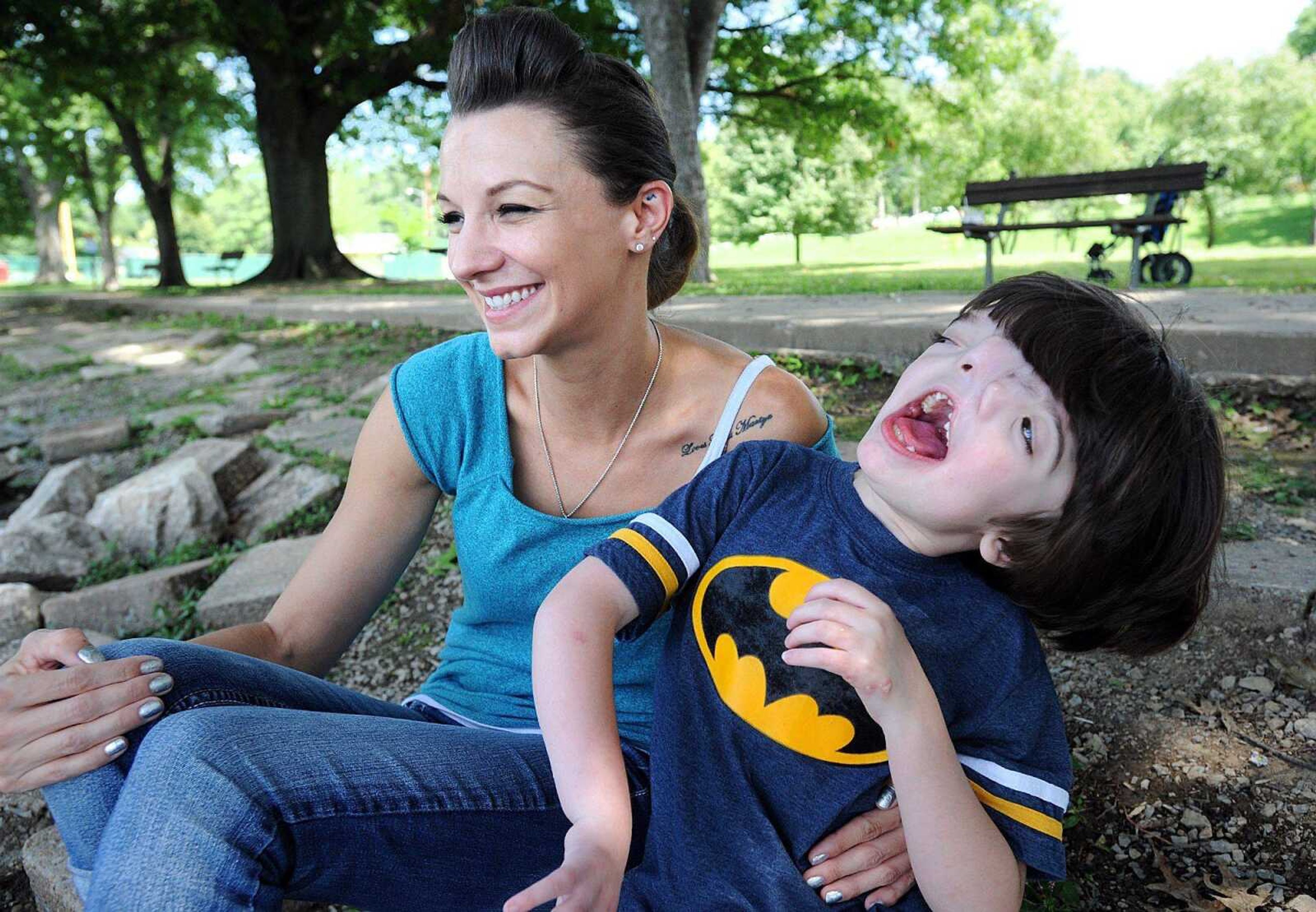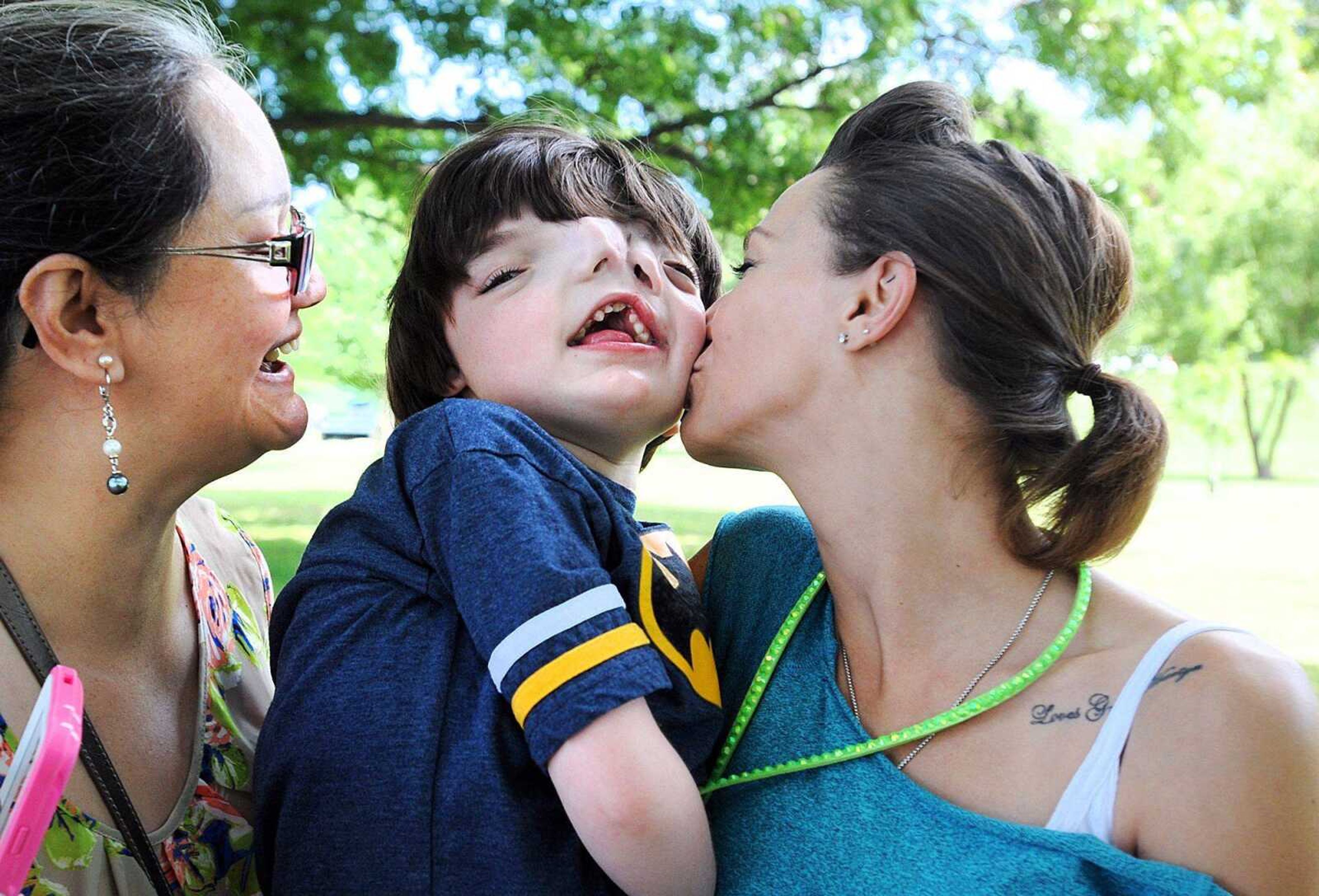A Bernie mom says legalization of cannabis oil for medical use is a good start toward legalizing medical marijuana
Brandy Johnson said the recently approved law allowing use of cannabis oil to treat Missouri patients with epilepsy is a good start toward further research and legalization of medicinal marijuana, but it's not enough. "It's a bittersweet victory," she said. "A small victory."...
Brandy Johnson said the recently approved law allowing use of cannabis oil to treat Missouri patients with epilepsy is a good start toward further research and legalization of medicinal marijuana, but it's not enough.
"It's a bittersweet victory," she said. "A small victory."
The Bernie, Missouri, mother of three became an advocate for medicinal marijuana after researching its benefits for those who suffer frequent seizures. Her youngest son, Tres, was born with diprosopus, commonly known as cranial duplication. It's been estimated that fewer than 40 such cases have ever been reported.
Much of the time, infants with the diagnosis are stillborn or given just a few days to live. Tres celebrated his 10th birthday in March.
While he's defied the odds, Tres still has a long battle ahead. He suffers more than 100 seizures a day and he's quickly run through available treatment options -- a problem exacerbated by the fact that his condition is unique from the other cases of cranial duplication because such duplication is not present in his brain.

"It makes treatment more difficult because you can't compare him to others," Johnson said.
She said people had asked her a couple of years ago about the possibilities of medicinal marijuana to treat her son's seizures, but Johnson said she ignored the suggestion at the time "because I thought I had options."
Right now, Tres has an implanted nerve stimulator that gives him regular shocks. When he has a seizure, Johnson can shorten its time by holding a magnet over the implant. Doctors recently had to boost the pulse of the implant -- something Johnson said they were unwilling to do initially because it didn't prove effective.
Like the nerve stimulator, Johnson said many of the treatments her son has tried cause him pain and discomfort. Just a few weeks ago, he nearly went into renal failure. The various drugs they have tried come with severe side effects, she said, and even a chance of death.
That's part of the reason Johnson turned to medicinal marijuana. Supporters have touted it as a way to provide relief to those who suffer from epilepsy. The most famous example is Charlotte Figi, a 7-year-old Colorado girl whose rare form of epilepsy has been successfully treated with a special strain of cannabis that is high in cannabidiol (CBD) and low in the psychoactive chemical THC. Missouri's recently approved law allows limited use of cannabis oil that has a similar balance; the "hemp extract" may be composed of no more than 0.3 percent THC, and at least 5 percent CBD.
While Gov. Jay Nixon signed the bill in July, Johnson said her son won't have access to the oil any time soon as various state agencies must work out the regulations. The new law allows only two not-for-profit growers to be licensed by the Department of Agriculture to produce hemp and requires patients or their parents to obtain a registration card from the Department of Health and Senior Services. The oil would only be available after a neurologist has determined the patient did not to respond to at least three treatment options.
The state health department also would set the rules for regulation and distribution, although the bill does specify patients and parents with valid registration cards would not be subject to penalties for possession of hemp abstract.
Johnson said treatment is expected to be available next year, but even with the new law, doctors may be hesitant to prescribe the oil. She said her son's doctors have expressed concern about prescribing the treatment, in part because of strict state and federal laws against marijuana. In Missouri, marijuana is considered a Schedule I drug, meaning it's not recognized as a drug with legitimate medicinal contributions. Opium and cocaine are considered Schedule II drugs which can be used by doctors.
Cannabis oil may not be a "miracle cure," Johnson said, but if it could help her son and others suffering with similar problems, it's wrong to deny them. She said she doesn't plan to stop advocating for medical marijuana until it's reclassified.
It's a stance similar to that of others in the epilepsy treatment field. The American Epilepsy Society has come out in support of "well-controlled research studies" and would like to see marijuana changed from its Schedule I status to allow more efficient research. That position also aligns with that of other medical societies such as the American Medical Association.
The lack of support for medicinal marijuana may also come from the social stigma surrounding the issue, Johnson said. When people hear about her fight to make the drug available to her son for treatment, she said she often receives criticism. Rather than getting angry and defensive, Johnson tries to offer reasonable answers to their questions and encourage others to do research.
"I'm not just saying this and it's not like my kid's going to be smoking marijuana," she said. "Research is everything. I always tell people 'Don't take my word for it. Do your research, and from more than one source.'"
Johnson is happy to see Missouri take its first step in recognizing the medical benefits of cannabis, but doesn't plan to slow her efforts to make it more readily available to those in need. Her plans include more discussions with lawmakers, including U.S. senators and Nixon. Johnson said her passion isn't just about helping her son, but the countless others that could benefit from medicinal marijuana in the future.
"I believe our struggles were given to us for a reason, to make us stronger and to help others," she said. "It's not just about helping Tres. If someone had done this before, we probably wouldn't be in this situation."
srinehart@semissourian.com
388-3641
Pertinent address:
Bernie, MO
Connect with the Southeast Missourian Newsroom:
For corrections to this story or other insights for the editor, click here. To submit a letter to the editor, click here. To learn about the Southeast Missourian’s AI Policy, click here.










